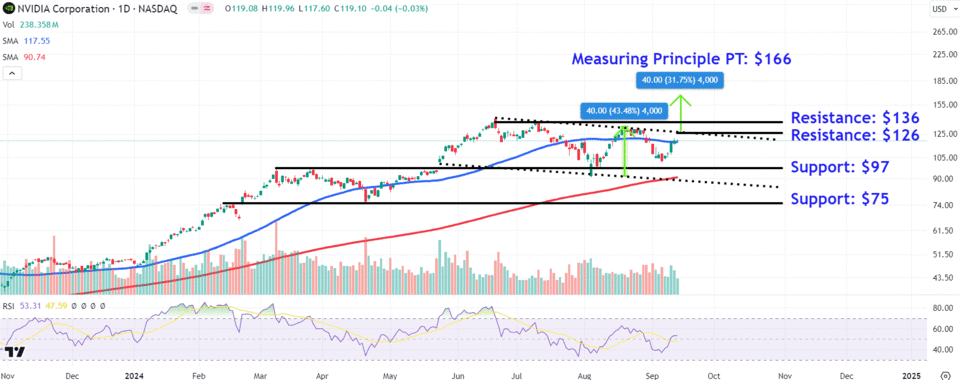Shares Gained Nearly 16% Last Week
Key Takeaways
Nvidia shares will likely remain on watchlists Monday after the AI investor darling surged last week as investors snapped up a recent dip in the stock.
The stock has rallied towards the top trendline of a descending channel, though the move has occurred on lackluster volume, indicating a lack of institutional activity.
Investors should monitor key overhead price levels on Nvidia’s chart at $126, $136, and $166, while watching important lower price levels at $97 and $75.
Nvidia (NVDA) shares will likely remain on watchlists Monday after the artificial intelligence (AI)-darling surged last week, as investors snapped up a recent dip in the stock following favorable Wall Street commentary pointing to continuing growth opportunities amid insatiable demand for AI infrastructure.
Last week, the AI chipmaker’s stock gained nearly 16% after dropping around 23% between late August and early September as investors’ optimism towards AI cooled in the wake of the company posting slowing quarterly growth, despite exceeding analysts’ earnings and sales expectations. However, market sentiment received a boost recently after Bernstein analysts called Nvidia “the best way to play AI,” while Bank of America analysts noted earlier this month that the recent pullback provides an “enhanced Buy opportunity.”
Below, we’ll take a close look at Nvidia’s chart and use technical analysis to identify important price levels to watch out for after recent swings in the stock.
Shares Trade Within Descending Channel
Since setting their record high in late June, Nvidia shares have traded within a descending channel, a chart pattern consisting of two parallel downward sloping trendlines that indicates a downtrend in the stock.
More recently, the price has made a move towards the channel’s top trendline, reclaiming the 50-day moving average (MA) in the process.
However, similarly to the August rally, the stock’s latest advance has occurred on lackluster volume, pointing to lack of participation from institutional investors. The stock gained 15.8% last week and closed Friday at $119.10.
Overhead Price Levels to Monitor
The first key area to monitor on the chart sits around $126, where the shares may run into resistance near the descending channel’s top trendline. It’s also worth watching for increasing trading volumes at this level, which may signal a looming breakout above the pattern.
If a breakout does take place, investors should eye the $136 region, a location where sellers may lock in profits near the stock’s June 18 record close, which also closely corresponds with the mid-July swing high.
To forecast a price target above Nvidia’s all-time high (ATH), we can use the measuring principle. To do this, we calculate the distance between the descending channel’s two trendlines and add that amount to the pattern’s upper trendline. For example, we add $40 to $126, which predicts an upside target of $166.
Lower Price Levels to Watch
If Nvidia’s shares move lower from current levels, investors should keep an eye on the $97 region, an area where the shares may encounter support near a horizontal line connecting the March twin peaks with a series of comparable trading levels positioned around last month’s low.
Further selling could lead to a breakdown below the channel’s lower trendline and 200-day MA that may see the stock revisit the $75 area, a location on the chart that would likely attract bargain hunters near the mid-February peak and April trough.
The comments, opinions, and analyses expressed on Investopedia are for informational purposes only. Read our warranty and liability disclaimer for more info.
As of the date this article was written, the author does not own any of the above securities.
Read the original article on Investopedia.
Credit: Source link




